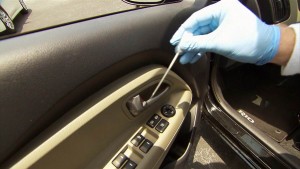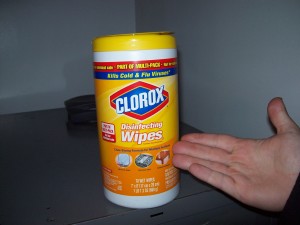4 Tips to Kill Germs in Your Car
If you, a close friend or family member is a germaphobe, tell them to stay out of a car. It sounds like a  sarcastic thing to say, but cars are breeding grounds for all sorts of microorganisms. In fact, if you were to put bathroom germ samples next to car samples, they’d probably look very similar. That’s why when you’re considering how to clean your car, you need to think beyond the basic vacuum and car freshener. When it comes to your health and driving, the phrase “what you don’t see can hurt you” rings true. However, knowledge of what these germs are, where they hide and how you can kill them can keep you and your family free from illness.
sarcastic thing to say, but cars are breeding grounds for all sorts of microorganisms. In fact, if you were to put bathroom germ samples next to car samples, they’d probably look very similar. That’s why when you’re considering how to clean your car, you need to think beyond the basic vacuum and car freshener. When it comes to your health and driving, the phrase “what you don’t see can hurt you” rings true. However, knowledge of what these germs are, where they hide and how you can kill them can keep you and your family free from illness.
Germs on Wheels
First of all, it’s a good idea to take a look at where these germs hide. On a somewhat frightening note, you can find them almost anywhere. But don’t panic over this since life is never truly germ-free.
Car Keys
It makes perfect sense for your car keys to be a source of germs. After all, they spend time in another place known to harbour a high concentration of germs – your hands. Naturally, you can expect to find many of the organisms known for spreading from person-to-person. Fortunately, you can minimize the spread by not allowing too many people to touch your keys and vice-versa.
Cabin Air
Some germs love to hang out in the air. If you’re the type to leave your windows rolled up all the time, there’s a strong likelihood that your car’s air has some pollutants trapped inside. A closed circuit of air allows germs and spores to contaminate your vehicle.
Carpet Upholstery & Seats
Unless you’re a super neat freak, you probably don’t realize the amount of food crumbs that fall into your seats and carpets. It isn’t until you do a thorough clean-up where you realize how much there is. Food crumbs often acquire bacterial growth over time, and they may spread into other areas of your vehicle. For you parents out there, beware of your child’s car seat: one study found, that children’s car seats contain more germs than toilet seats. They found an astounding 100 bacteria per square centimeter on car seats; toilets only had 10 – 50 bacteria per square centimeter.
Door Handles, Buttons and Controls
The highest source of germs in your car would definitely be the objects which you touch the most. And there are a quite a few of them. Think of your steering wheel for example. Although it’s use is unavoidable, it could also be a reason why you occasionally catch a case of the sniffles. One study found steering wheels to contain a staggering 700 species of bacteria! Until you buy a self-driving car, you might want to wear gloves (or keep hand sanitizer in the cupholder). There are also door handles and dashboard buttons, which frequently get touched by others. As the saying goes, you don’t know where those hands have been.
Types of Germs
Not only is there diversity in terms of where you can find car germs, there is a diversity of germs hanging out in your car as well. Some of them will make you sick to the stomach, while others will make you torment with sore throats and coughing. If you aren’t careful, your vehicle may turn into a mixed basket of germs, waiting to make you sick.
Cold/Flu Viruses
Although a cold or the flu usually heals within a week or so, it’s undeniable how miserable they can make you feel. The aches, the fever, the coughing, the stuffiness – suffering with these symptoms will either leave you bed-ridden, or make you run for cough medicine. Your car is a resting place for the cold and flu viruses, especially during the winter. So don’t let your passengers get away with tissues lying around.
Stomach Bugs
It’s a good thing the 24 hour flu is just that. The nausea, vomiting and stomach cramps that come with such bugs can bring the biggest and strongest of us to our knees. There are quite a few germs that can cause these gastrointestinal symptoms, including Norovirus as well as E.Coli and salmonella bacteria (which may linger in car seats for children). Many of these germs find a home in cars that are filled with wrappers, food crumbs and other things that belong in the trash.
Mould & Allergens
 An often overlooked cause of car-related illness are allergens and mould. The problem with these microscopic particles is that they may linger in a car that looks clean on the inside. For example, a vehicle’s air conditioner/heater unit may blow irritating particles throughout the car. This could mean bad news for people with allergies or asthma. In fact, it’s safe to say that if you’re sneezing and itching only while driving, the source of your allergies is probably in your vehicle.
An often overlooked cause of car-related illness are allergens and mould. The problem with these microscopic particles is that they may linger in a car that looks clean on the inside. For example, a vehicle’s air conditioner/heater unit may blow irritating particles throughout the car. This could mean bad news for people with allergies or asthma. In fact, it’s safe to say that if you’re sneezing and itching only while driving, the source of your allergies is probably in your vehicle.
How to Clean Your Car
Don’t worry about your car turning into a cesspool for germs – there’s a lot you can do to keep it fresh and sterile. It all boils down to effort and frequency. If you keep up with the cleaning of your car, you’ll significantly reduce the likelihood of getting sick from your vehicle.
Tips on How to Clean Your Car for Germ Protection
- Brush & Vacuum – Food crumbs and other visible particles often promote bacterial growth. You can remove these particles with thorough brushing and vacuuming. This isn’t an activity you have to do weekly – once a month can do the trick.
- Shampooing – Tiny particles such as pollen, dust and other germ containing particles may hide in seat and carpet upholstery. That’s why it’s important to shampoo your vehicle’s interior from time-to-time. Not only will it kill germs, it will give the inside of your car a pleasant odour. Generally speaking, you can resort to a shampooing of your vehicle when you take it in for auto detailing at your local car loan dealership.
- Disinfectant – Some germs are quite hardy, making it important to take your cleaning a step further. That’s where disinfectants come handy. For the dashboards and door panels, you can use a disinfectant wipe. You can also use a specialized formula designed to disinfect car surfaces.
- Replace Cabin Filters & Have AC Cleaned – Remember too, that your car’s air quality plays a major role in how you’ll feel while driving. If your AC and cabin filters are clogged with gunk, the circulation of air in your car will most likely carry some pollutants, whether they are pollen spores or germs. Therefore, it’s essential to have your cabin filters replaced according to your manufacturer’s recommendations. Also, have your mechanic clean out your AC vents to ensure it’s working and clean.
A Clean Ride
Your car’s performance should be about more than just horsepower, acceleration or handling. Your  health and safety comes first. Germs will always find their way into your car, but they don’t have to make you sick. The key to staying healthy is learning how to clean your car. By establishing a regular cleaning schedule, you can keep the worst of disease-causing germs out of your life. You might even find relief from chronic ailments such as allergies or sinus problems.
health and safety comes first. Germs will always find their way into your car, but they don’t have to make you sick. The key to staying healthy is learning how to clean your car. By establishing a regular cleaning schedule, you can keep the worst of disease-causing germs out of your life. You might even find relief from chronic ailments such as allergies or sinus problems.






